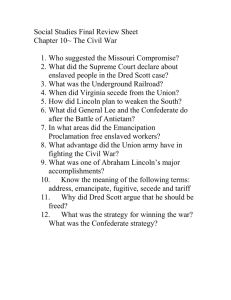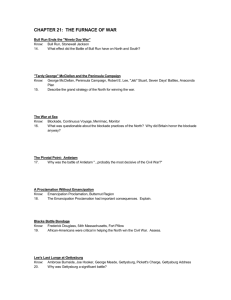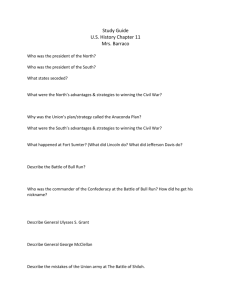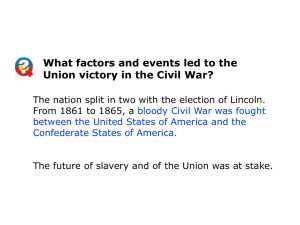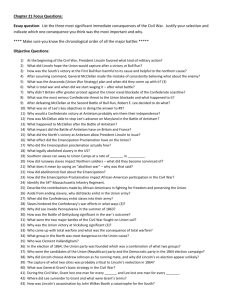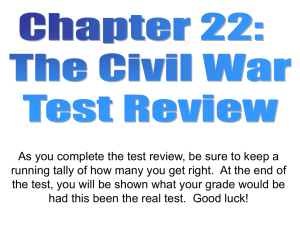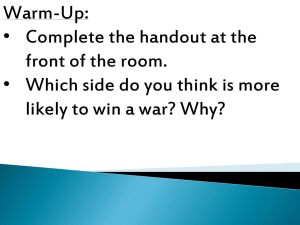Civil War
advertisement
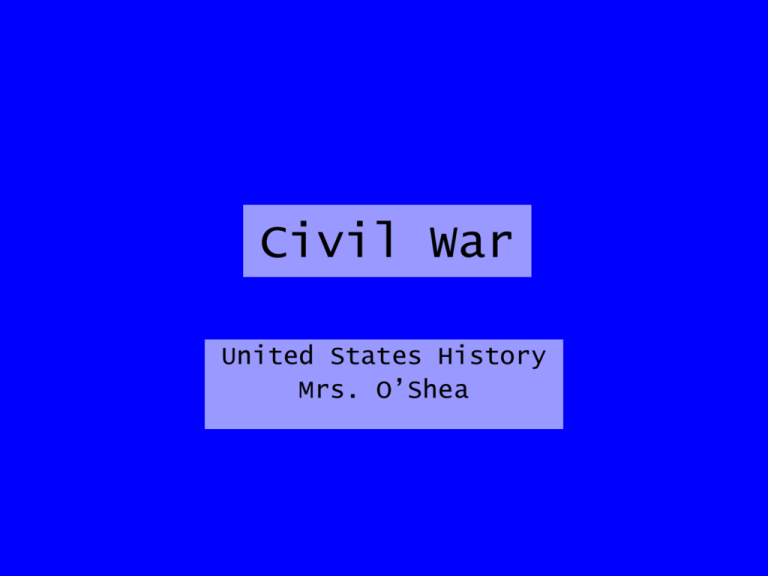
Civil War United States History Mrs. O’Shea 1860 Presidential Election • • • • Abraham Lincoln won 39% popular vote 180 electoral votes not a single electoral vote from South Name did not appear on many southern ballots 1860 ELECTION RESULTS Southern Secession South Carolina seceded in Dec. 1860 6 others states followed = Texas Louisiana Mississippi Alabama Florida Georgia Created Confederate States of America Fort Sumter • Federal fort outside Charleston, SC • Federal supply ship shot at by Confederates • Lincoln wanted to preserve Union – must protect fort • April 12, 1861 – Confederates seize fort • Lincoln called on loyal states to supply 750,000 militiamen to subdue the rebellion. • Ordered blockade of southern ports. Battle of Bull Run • Union troops – not prepared • Sent by Lincoln to capture Richmond – Confederate capital city • Met with 32,000 Confederate troops outside of Manassas. • Union troops were sent running back to Washington, D.C. IMPORTANCE • Boosted Confederates morale • Signaled to Union that they needed to prepare for a real war CASUALTIES • Heavy casualties on both sides – killed, wounded, captured, or MIA • Disease (typhoid fever, dysentery, salmonella, gangrene, malaria) Casualties (deaths) Revolutionary War = 4,400 Mexican American War = 13,000 Civil War = 600,000 WWI = 115,000 WWII = 407,000 Korean War = 33,000 Vietnam War = 58,000 War in Iraq = 4,244 (as of February 13, 2009) Really rough estimates – Mrs. O’Shea Casualties (deaths) 700,000 600,000 600,000 500,000 400,000 300,000 200,000 115,000 100,000 4,400 13,000 33,000 58,000 4,244 M ex ic an II Ko re an W ar Vi et na m W ar W ar in Ira q W W I W W il W ar Ci v W ar an er ic Am tio na ry W ar 0 Re vo lu Deaths 407,000 Lincoln and Slavery • “Preserve the Union” • Personally opposed to slavery • Came to regard abolishing slavery as a strategy for winning war • Slave working in field = one more Southerner fighting in fields Emancipation Proclamation p. 396 • effectively removed any chance of a negotiated settlement between the North and the South. • The Emancipation Proclamation caused an outcry to rise from the South who said that Lincoln was trying to stir up slave rebellion. • The North now had a much stronger moral cause. It had to preserve the Union and free the slaves. African Americans in War • July 1862 – Congress allows African-Americans to join military • January 1, 1863 – Emancipation Proclamation – encouraged freed slaves to fight • By 1865 – 180,000 African Americans had enlisted (10% of troops) • Less pay • Black regiments – white officers • 54th Massachusetts Infantry – bravery in attack on Ft. Wagner – first medal of honor (Sergeant William Carney) GLORY Plans to Win!!! • Union – attacked from West and East – Anaconda Plan (choke them) • Confederacy – attacked Union through Virginia (scare Northerners – fuel anti-war movement in North) Gettysburg Address • • • • Dedication of cemetery Honors Union soldiers Expresses grief of nation Necessity of preserving the Union http://www.npr.org/templates/story/story.php ?storyId=1512410 North – Strategy Anaconda Plan – General Winfield Scott Slowly entwine and crush Bull Run • Bull Run Ends the "Ninety-Day War" • President Abraham Lincoln concluded that an attack on a smaller Confederate force at Bull Run would be worth trying. If successful, the victory would show the superiority of Union arms and might eventually lead to the capture of Richmond. • On July 21, 1861, the Union and Confederate forces met. A Union victory was thought to be for sure, as evident when spectators showed up. The Confederates won as "Stonewall" Jackson held his line of Confederate soldiers until reinforcements arrived. Antietam • • • • • The Pivotal Point: Antietam After General Lee crushed McClellan's forces in Richmond, Lee moved northward. In the Second Battle of Bull Run (August 29-30, 1862), General Lee defeated General Pope's Union forces. As Lee moved into Maryland, he met McClellan's forces again at the Battle of Antietam on September 17, 1862. McClellan managed to halt Lee's forces after his forces discovered Lee's battle plans. Although not a victory, the Union stopped the Confederate march northward. Antietam provided Lincoln with the military backing to issue the preliminary Emancipation Proclamation on September 23, 1862. On January 1, 1863, Lincoln issued a final proclamation. Lincoln now made the Civil War a war to end slavery because he declared that "the rebels could not experiment for 10 years trying to destroy the government and if they fail still come back into the Union unhurt." The Confiscation Act of 1862 punished "traitors" by declaring their slaves property of war who shall be free. Total War • extensive destruction and appropriation of property not justified by military necessity and carried out unlawfully and wantonly • unlawful deportation, transfer, or confinement. • It was adopted in August 1949, and defines humanitarian protections for civilians in a war zone, and outlaws the practice of total war. • Art. 53. Any destruction by the Occupying “War is cruelty. The crueler it is, the sooner it will be over.” Sherman’s March p. 412 • Union General William Sherman’s total war • GOAL = destroy the Confederacy's ability to wage further war • 300 mile path of destruction – destroying railroads, bridges, factories, livestock, crops, etc. • Most likely speed up the ending of the war South Surrenders Lee surrenders to Grant at Appomattox Court House, Virginia (private home – not a court building) -take horses and go home -obey laws April 9, 1865 Lincoln Assassinated • April 14, 1865 • John Wilkes Booth – wanted to kidnap in exchange for Confederate prisoners. • Changed plans – killed Lincoln • Ford’s Theater Execution

